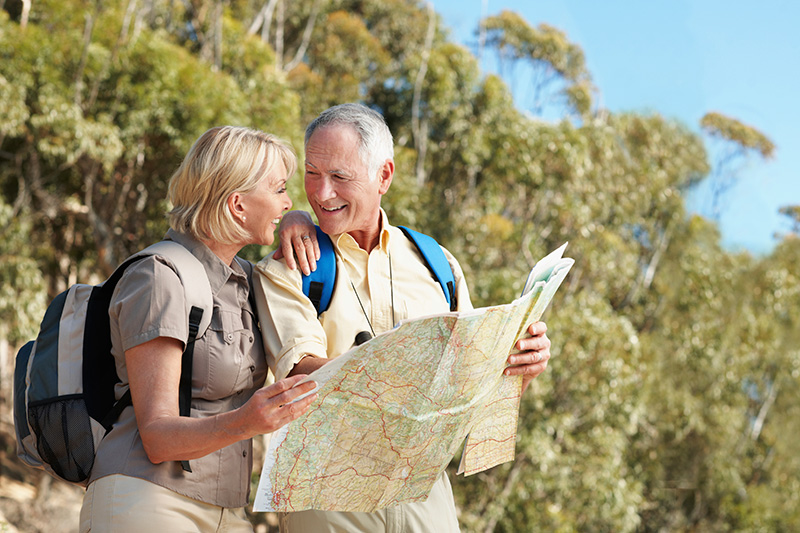SIZE
Leaves are Meant to Fall, Not You! Fall Prevention Tips that Support Independent Living for Seniors
Autumn is a favorite season for many. Between the crunchy, colorful leaves, the warm beverages (maybe with a little pumpkin spice thrown in!), creative decorations and the transition to sweater weather, what’s not to love! While we want the word “fall” to make you think of these fun and festive things, accidents do happen. According to the National Institute on Aging, 1 in 4 adults report a fall every year. The reality is: falls are common, costly and often preventable. These events are the leading cause of injury for older adults ages 65 and older and one of the biggest threats to fully independent living for seniors.
“Unfortunately, seemingly simple accidents can lead to major setbacks for a senior’s health and wellbeing,” described Amy Wagaman, Senior Vice President of Operations of Ecumenical Retirement Community. “Resident safety is always top priority, so we plan room layouts, activities and co-worker responsibilities to create environments where independent living for seniors is possible, and residents feel confident and supported-with every step.”
The risk of falling does rise with age, but there are ways to mitigate some of the risks and calm fears.
Acknowledge Fall Risk
Certain health conditions and even medications can affect balance. Diagnosis such as diabetes, heart disease or problems with circulation can lead to falls. Medications that may increase the need to use a restroom, particularly at night, cause dizziness or confusion, or contribute to muscle loss could put a senior in a higher fall-risk category. Additionally, evaluating the location of physical objects such as rugs that may cause slips or furniture that may be a trip hazard, is a good step in creating a safer environment.
Stay Active
Simple stretches like chair yoga and balance exercises can help build strength, improve circulation and prevent stiffness. Walking is another great activity that encourages independent living for seniors when they enjoy the seasonal fresh air while also staying fit. When exercising outdoors, make sure shoes have good traction and you are wearing weather-appropriate clothing. Just watch out for outdoor fall risks such as uneven surfaces, curbs and steps, and wet surfaces.
“We encourage residents to keep moving but with a focus of safety first,” says Michelle Wycheck, Ecumenical’s fitness director. “This could mean testing out a stationary bike instead of a walk on a rainy day, or joining a fitness class for the first time. It doesn’t have to be rigorous exercise to make a big impact.”
Chat with Your Doctor
Consider scheduling appointments to get hearing and vision checked, because, when impaired, both senses can contribute to falls. Being diligent about wearing hearing aids, glasses and contacts as prescribed can help mitigate falls. Additionally, discussing side-effects of prescribed medications can help toward more independent living for seniors when they feel in control of their protocol. Additionally, this knowledge allows families or caregivers make a plan to monitor side effects.
Fall-Proof Your Living Space
The National Institute of Aging has provided a room-by-room guide of things to look for when fall-proofing a living space that promotes independent living for seniors. From the floors to the outdoors, there could be easy-to-miss trip hazards that vary depending on the season and could make a difference in maintaining independence.
Install Emergency Call Systems
There are many Life-Alert style call systems that facilitate contacting emergency response should a fall situation occur. In addition to providing peace of mind for families, this type of technology could be a lifeline in independent living for seniors and make a difference in injury severity when proper and timely medical attention is administered after a fall event. AARP shares tips on selecting the system that is right for you or your family.
More tips that Support Independent Living for Seniors from Ecumenical Retirement Community
Falls don’t just happen, but when monitoring and mitigation efforts are put in place, there is a lower chance of serious injury. With some adjustments to routine or even seeking out additional support, the favorite season of fall does not have to turn into fall-risk season.
Looking for more tips or have questions? Learn how improving balance prevents falls or contact an advisor to talk through other ideas and fall-prevention solutions.
Categories:
- All
- Alzheimer's
- Assisted Living
- Blood Drive
- car wash
- caregiver
- christmas
- Community Blood Drive
- community event
- Comparing Retirement Community Costs
- Dance
- dementia
- dining
- donate
- donations
- easter
- easter bunny
- easter egg hunt
- ecumenical
- exercise
- fall prevention for seniors
- family
- Family Community Event
- For Adult Children
- grace
- Grandparents Day
- health
- holiday season
- Holidays
- Independent Living
- Kids Event
- Memory Care
- moving to a retirement community
- Personal Care
- pets
- retirement community
- retirement home
- Safety
- social activities
- the longest day
- tree lighting
- trial stay
- V Day
- winter

